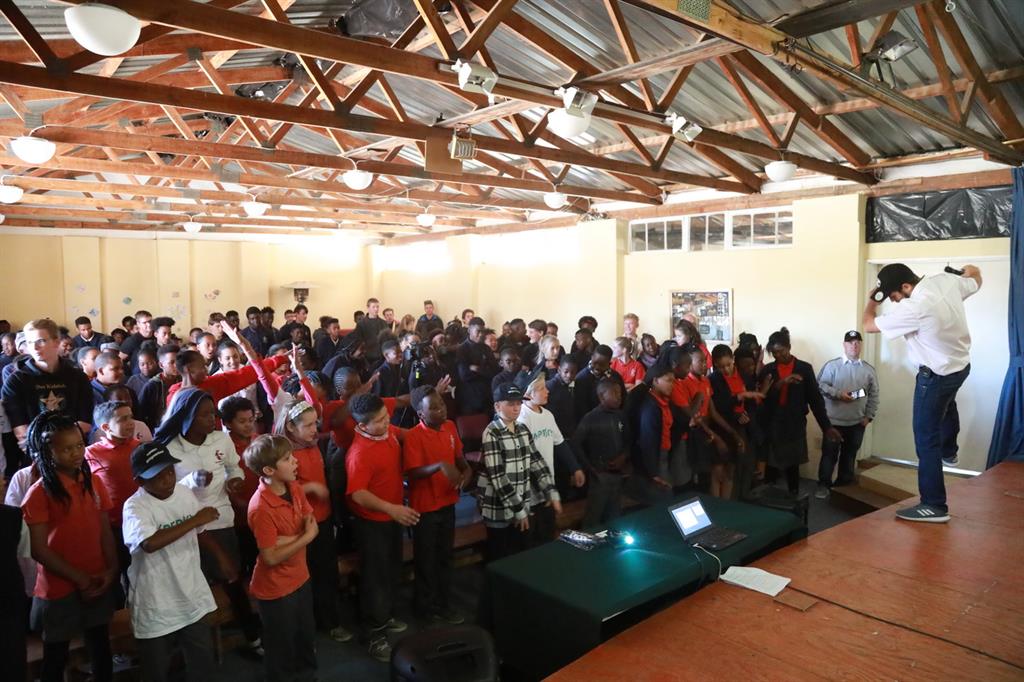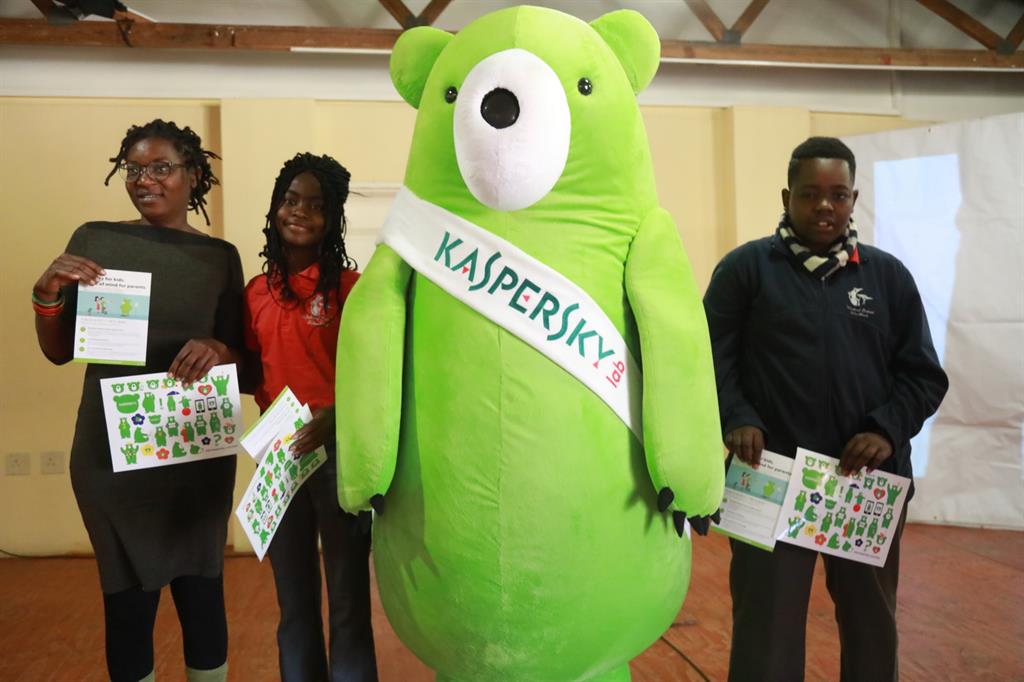Online safety for our Namibian children
Kaspersky Lab, a global cyber security company, in partnership with Active Education, is bringing cyber security education to Namibian schools through a series of interactive activations.
An initiative aimed at driving top-of-mind awareness around online safety, has kicked off in Namibia.
The Safe Kids Roadshow1 started on 10 September in Windhoek and will move to Walvis Bay and conclude on 21 September in Swakopmund, while covering 20 schools and a total of over 13 700 children and parents.
Among the main threats to be addressed are cyber bullying, the inordinate disclosure of personal information and general rules of online behaviour.
The roadshow is an educational initiative by Kaspersky Lab, together with a third-party education provider.
During the global project, Kaspersky Lab has educated about 16 000 kids across the META region in South Africa, the United Arab Emirates (UAE) and Bahrain.
This follows the Kaspersky Lab and B2B International Security Risks Survey 2017.
While the internet provides many benefits to children, it can also be a dangerous place for them, and as such, it is essential that children are educated about online security and parents know and understand their children's online activities in order to protect them.
Alarmingly, 32% of parents surveyed globally, admitted that they do not have any control of what their children see or do online, and about 25% do not take any measures to protect their children from online threats.
Riaan Badenhorst, general manager for Kaspersky Lab Africa, said protecting children is something that Kaspersky Lab takes very seriously on a global scale, which is why they recommend parents using not only parental control products, but also having a trust relationship with their child.
“No matter what kids are doing online, it is important for parents not to leave their children's digital activities unattended and to educate them about online security. The more information you have as a parent, the more you are able to protect them,” says Badenhorst.
Lastest update
Kaspersky Lab's global latest report, based on statistics from the company's parental control modules, has revealed that children in Namibia are more likely to watch video content and listen to music, than spend time on social media.
Audio and video content accounted for 50% of all online activities of Namibian children, with YouTube and DVDVideoSoft being popular among the young generation, while younger kids prefer Nickelodeon Africa.
This was followed by 31% interested in internet communication media - in the majority of cases, this is referred to as social media/networks - with popular ones being Facebook, Google Hangouts, Skype and WhatsApp.
Children in Namibia also visited news sites more frequently, including the BBC and the Daily Mail - accounting for 8% of activities.
Electronic commerce is among the top categories as well: 5% of children showed their interest in exploring Amazon for clothes and mobile devices.
At the same time, 12% of respondents globally admitted that their children became addicted to the internet, and the same amount complained that their children saw explicit content online. Malware is another big problem. Digital devices can easily be infected while children play or search online; this happened to 10% of the users surveyed.
“As a school, we fully support the need to educate and create awareness about online safety, especially as our learners are exposed to more than ever before; and while this opens up immense learning opportunities, we need to be cognisant of their safety,” said Kathi Damon, the primary school principal at Waldorf School Windhoek.
“With this in mind, we fully support the activation that Kaspersky Lab has initiated for our learners and look forward to the positive impact it will have.”
Kids in different countries have different interests and online behaviour but what links them all is their need to be protected online from potentially harmful content.
To help children avoid such threats, Kaspersky Lab experts advise parents to talk with their children, in order to educate them about correct behaviour and security on the internet, to ensure they know not to publish too much personal information that attackers can use; and that it is not necessary to join groups with potentially dangerous content or to 'friend' someone they don't personally know or follow links from unknown recipients.
The Kaspersky Total Security and Kaspersky Internet Security consumer solutions include a parental control module to help adults protect their children against online threats and block sites or apps containing inappropriate content.
In turn, the Kaspersky Safe Kids solution allows parents to monitor what their children do, see or search for online across all devices, including mobile ones, and offers useful advice on how to help children behave safely online.
The Safe Kids Roadshow1 started on 10 September in Windhoek and will move to Walvis Bay and conclude on 21 September in Swakopmund, while covering 20 schools and a total of over 13 700 children and parents.
Among the main threats to be addressed are cyber bullying, the inordinate disclosure of personal information and general rules of online behaviour.
The roadshow is an educational initiative by Kaspersky Lab, together with a third-party education provider.
During the global project, Kaspersky Lab has educated about 16 000 kids across the META region in South Africa, the United Arab Emirates (UAE) and Bahrain.
This follows the Kaspersky Lab and B2B International Security Risks Survey 2017.
While the internet provides many benefits to children, it can also be a dangerous place for them, and as such, it is essential that children are educated about online security and parents know and understand their children's online activities in order to protect them.
Alarmingly, 32% of parents surveyed globally, admitted that they do not have any control of what their children see or do online, and about 25% do not take any measures to protect their children from online threats.
Riaan Badenhorst, general manager for Kaspersky Lab Africa, said protecting children is something that Kaspersky Lab takes very seriously on a global scale, which is why they recommend parents using not only parental control products, but also having a trust relationship with their child.
“No matter what kids are doing online, it is important for parents not to leave their children's digital activities unattended and to educate them about online security. The more information you have as a parent, the more you are able to protect them,” says Badenhorst.
Lastest update
Kaspersky Lab's global latest report, based on statistics from the company's parental control modules, has revealed that children in Namibia are more likely to watch video content and listen to music, than spend time on social media.
Audio and video content accounted for 50% of all online activities of Namibian children, with YouTube and DVDVideoSoft being popular among the young generation, while younger kids prefer Nickelodeon Africa.
This was followed by 31% interested in internet communication media - in the majority of cases, this is referred to as social media/networks - with popular ones being Facebook, Google Hangouts, Skype and WhatsApp.
Children in Namibia also visited news sites more frequently, including the BBC and the Daily Mail - accounting for 8% of activities.
Electronic commerce is among the top categories as well: 5% of children showed their interest in exploring Amazon for clothes and mobile devices.
At the same time, 12% of respondents globally admitted that their children became addicted to the internet, and the same amount complained that their children saw explicit content online. Malware is another big problem. Digital devices can easily be infected while children play or search online; this happened to 10% of the users surveyed.
“As a school, we fully support the need to educate and create awareness about online safety, especially as our learners are exposed to more than ever before; and while this opens up immense learning opportunities, we need to be cognisant of their safety,” said Kathi Damon, the primary school principal at Waldorf School Windhoek.
“With this in mind, we fully support the activation that Kaspersky Lab has initiated for our learners and look forward to the positive impact it will have.”
Kids in different countries have different interests and online behaviour but what links them all is their need to be protected online from potentially harmful content.
To help children avoid such threats, Kaspersky Lab experts advise parents to talk with their children, in order to educate them about correct behaviour and security on the internet, to ensure they know not to publish too much personal information that attackers can use; and that it is not necessary to join groups with potentially dangerous content or to 'friend' someone they don't personally know or follow links from unknown recipients.
The Kaspersky Total Security and Kaspersky Internet Security consumer solutions include a parental control module to help adults protect their children against online threats and block sites or apps containing inappropriate content.
In turn, the Kaspersky Safe Kids solution allows parents to monitor what their children do, see or search for online across all devices, including mobile ones, and offers useful advice on how to help children behave safely online.







Comments
Namibian Sun
No comments have been left on this article